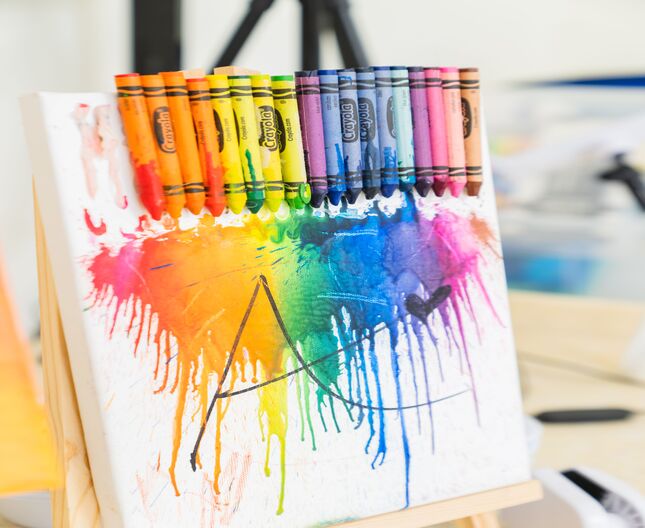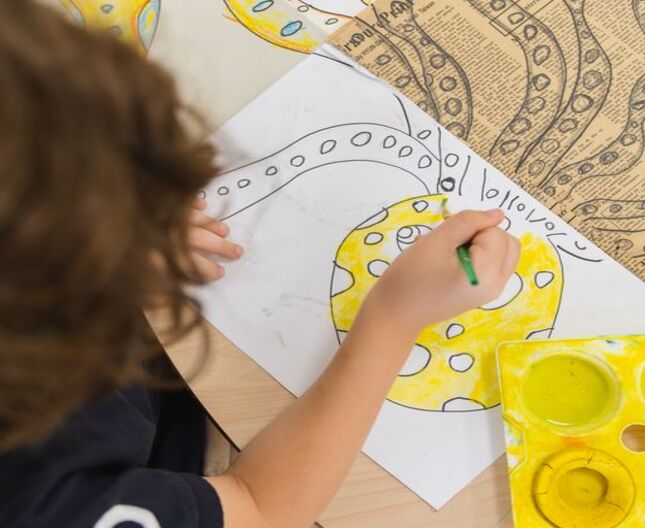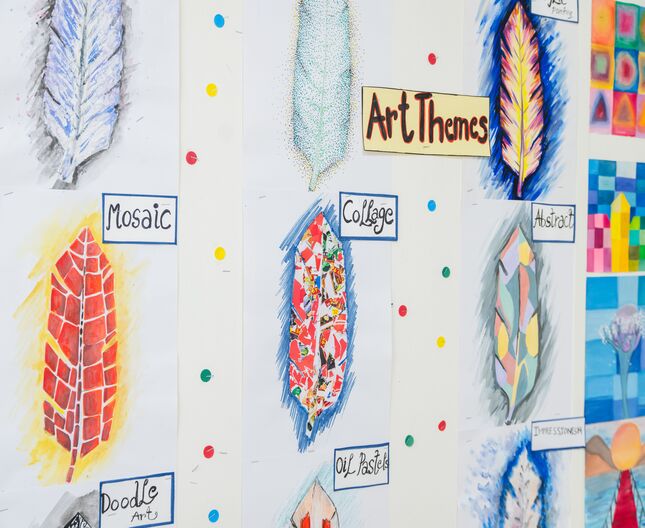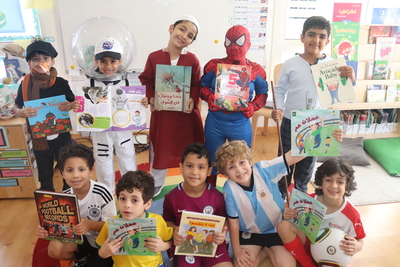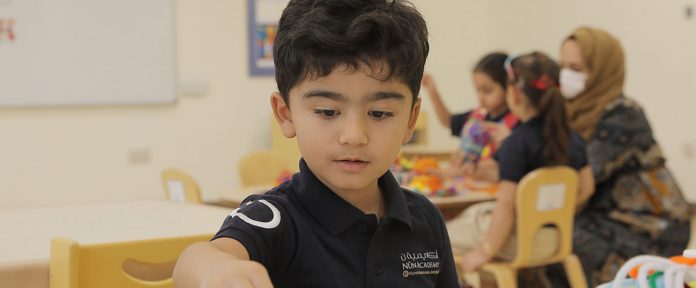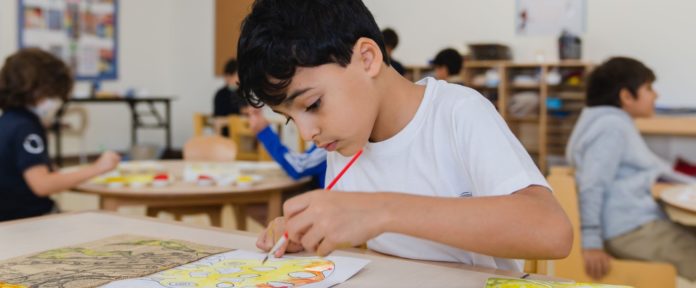In Upper Primary (Y4-Y6) our students balance academics with increased social responsibility in order to become proactive, caring global citizens and learners who address life’s challenges, take responsibility for their lives and seek to make a positive impact on their world. Instruction in Upper Elementary is primarily in English, and each subject ( English, Mathematics, Science, Arabic, Islamic Studies, Social Studies, Art, Music and Physical Education) is taught by content area specialists. Our teachers work to ensure that our academic and non-academic programs meet the diverse needs of each of our students and offer voice, choice and opportunities for authentic learning.
Upper Primary Overview
Upper Primary English Language
In Upper Primary, our mission is to instil a love and enthusiasm for reading and writing through well structured, exciting, engaging lessons.
Typically, students in Years 5 and 6 have a strong understanding of phonics and are ready to read, write and discuss texts at a deeper level. We use RWI Literacy and Language, a comprehensive programme that covers a variety of genres with a focus on grammar, vocabulary and comprehension. Students have ample opportunities to write, from daily logs to longer, imaginative pieces. In addition, they develop oral language and confidence through drama, performance and small group collaboration.
To provide our students access to various high-quality texts at their reading level, we have invested in Oxford Owl reading materials. Oxford Owl online and classroom libraries offer a wealth of interesting, enjoyable stories and non-fiction texts in different levels that can be used in guided reading sessions or assigned to the children for independent reading practice.
We aim to have all our children write in fluent, neat, joined handwriting across all subjects. We follow the Nelson Handwriting scheme, which begins with a focus on forming all individual letters correctly.
Year 5 and 6 children who are not quite ready to access the Literacy and Language programme learn with our RWI Fresh Start curriculum. Fresh Start offers children opportunities to practice their sound pattern recognition daily and read age-appropriate texts and write different genres based on the module. We also provide high-interest, culturally relevant materials to supplement their learning. In addition, the children are encouraged to engage in regular discussion, thus expanding their oral language and vocabulary through discussion.
Upper Primary Arabic Language
At Nün, we enable students to master the Arabic language, discover its beauty and strengthen their connection with the language and with their culture. Our curriculum is built on rigorous performance standards and includes the best teaching methods in terms of curriculum design, content, and assessment. Our students have access to a wide range of novels, stories, original children’s literature and informational texts. They develop their language skills with levelled texts that meet the learning needs of each student as they read closely, think critically, write effectively and create beautifully in Arabic.
Arabic Language Levels:
L1A
For Arabic speakers. For those who are at year level reading, writing, speaking and listening.
L1B
Students who partially speak a dialect and are not proficient in reading, writing, and speaking Standard Arabic at the class level, so they are supported and taught the language in small groups that enable them to acquire the foundational skills that prepare them to learn the language at the class level.
L2
Non-Arabic speakers follow a curriculum that supports the development of the Arabic language enabling the student to develop their reading and writing skills based on the “Arabi 21” standards for non-native speakers.
Upper Primary Mathematics
In Upper Primary, students extend their knowledge of the key areas of mathematics outlined in the English National Curriculum for Mathematics. They begin to encounter more complex and sophisticated mathematical problems to help deepen their understanding of significant concepts and use models, pictures and symbols to represent and communicate mathematical ideas.
In years 4 to 6, we teach mathematics using Maths No Problem, a programme based on the internationally renowned, highly successful approach to mathematics developed in Singapore. Students explore concepts through hands-on exploration and collaborative group work. Lessons are carefully sequenced so that the students continue to build on the learning from previous lessons as they move through the curriculum.
Topics Covered:
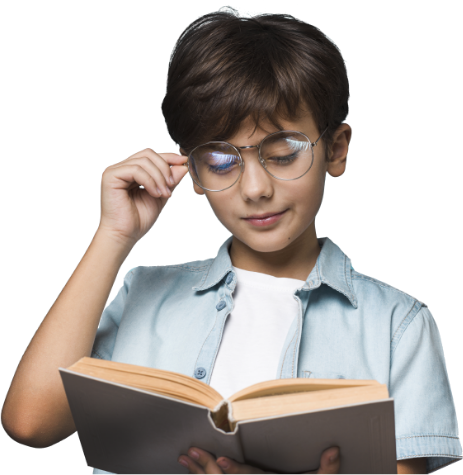
Our upper primary maths programme is comprehensive and varied and prepares students for the demands of Upper Primary mathematics by the end of Year 6.
Upper Primary Science
The important thing in science is not so much to obtain new facts as to discover new ways of thinking about them.
At Nün Academy, we aim to stimulate our students to be curious about the world around them, to think critically, and to take action to make a positive impact on their world. Science is an integral part of our school’s vision. The Cambridge Primary Science curriculum helps learners develop a love of Science through our practical, hands-on approach to teaching the concepts in biology, chemistry, physics and Earth science.
We encourage students to develop enquiring minds and become independent and focused learners who desire academic success in the years to come. We also help students gain a lifelong passion for Science. We follow the KED program for Science, which aligns with the Cambridge International Lower Secondary Science Stage 7 Scheme of Work and provides a unique experience for students.
Selected themes and topics relate to the Global World and environmental issues, reflect those of the Cambridge curriculum, and allow for the development of practical skills in scientific investigations alongside building upon scientific knowledge and understanding. Cambridge IGCSE Combined Sciences gives learners the opportunity to study Biology, Chemistry and Physics, each covered in separate syllabus sections. It is a single award qualification, earning one grade. Learners gain an understanding of the basic principles of each subject through a mix of theoretical and practical studies, while also developing an understanding of the scientific skills essential for further study.
They learn how science is studied and practised, and become aware that the results of scientific research can have both positive and negative effects on individuals, communities, and the environment. As well as focusing on the individual sciences, the syllabus helps learners to understand the technological world in which they live and take an informed interest in science and scientific developments.
Biology
The study of living things. Cells and organisms Living things in their environment Variation and classification Food and digestion Respiration and the circulatory system Reproduction and development

Chemistry
The study of matter. States of matter Elements and compounds Material properties Material changes Mixtures

Physics
The interaction of matter and energy. Forces and motion Energy Measuring motion Sound Light Magnetism

Earth and Space
Planet Earth, the Solar System and beyond The earth and beyond Pollution

Thinking and Working Scientifically
Develops understanding and skills of scientific models and representations, scientific inquiry and practical work. Model making Observation Measurement Forming hypotheses Controlling variables

Science in Context
Helps teachers demonstrate the relevance of science to learners Photosynthesis and fruit production Preparing yogurt and bread dough with M.Os Measuring forces made by different objects used daily and relating that to their masses. Modelisation of digestion and respiration Speed calculation for a runner and a vehicle

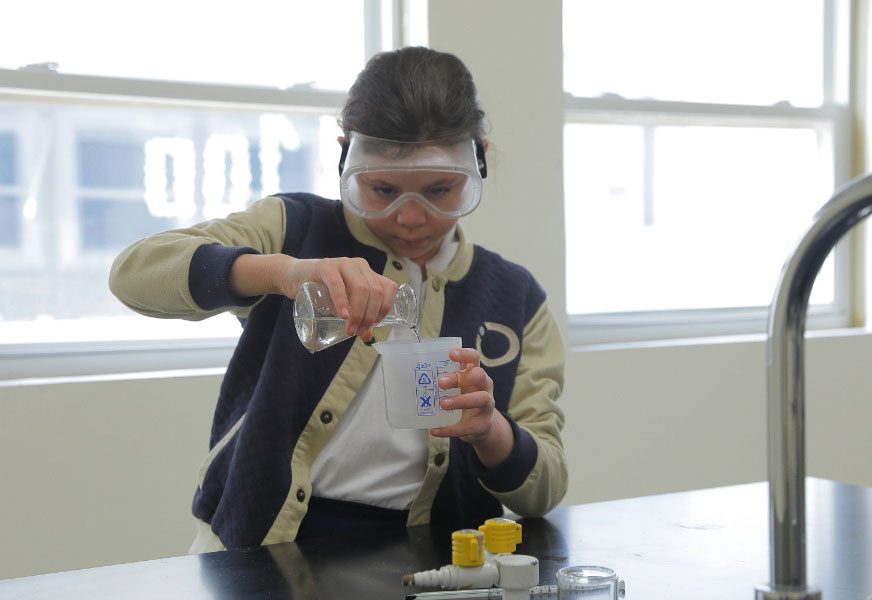
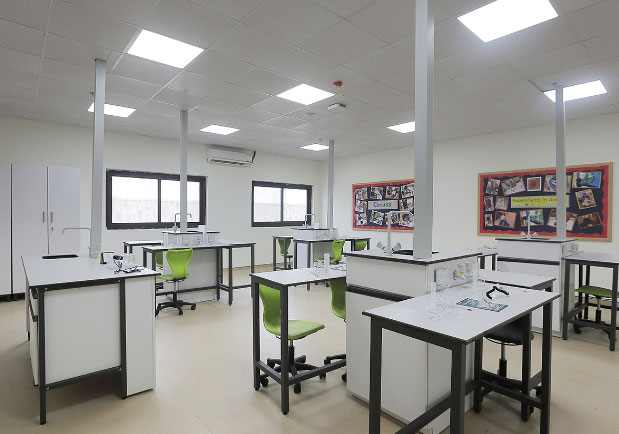
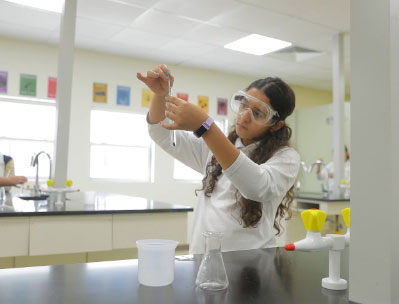
Upper Primary Specialist Classes
Upper Islamic Curriculum (Year 4 - Year 6)
In the name of Allah, the Most Gracious, the Most Merciful: “And I did not create the jinn and mankind except to worship Me.” Surah Al-Dhariyat (65)
The purpose of the religion of Islam is to achieve submission and obedience to Allah as a comprehensive concept, which is not limited to the performance of the statutes of worship, but goes beyond that to include our life style,, our beliefs and our relationship with our surroundings, committed to Allah’s law and applied to the words of Allah Almighty, ” The true religion with Allah is Islam” Surah Al Imran (19)
Since the subject of Islamic education includes the relationship of man with his Creator, his family, his community and himself, the importance of its teaching is beneficial for both individuals and our society. . Globalisation social media and technology signify a cultural invasion that can threaten our culture and Islamic teachings. Emerging generations can lose the balance between the knowledge and practice of our Islamic faith. Therefore, we provide a curriculum that fits the needs of the 21st century student by introducing emerging issues and taking into account the environment and local culture in the Kingdom. This means that the curriculum is not only limited to the acquisition of knowledge but considers the use of this knowledge in everyday life. Our students explore Islamic values and practice the skills needed to be a believer in the faith, committed to Islamic values, open positively to others, compassionate, proud of their identity, aware of their responsibility and loyal to their country.
The Islamic curriculum at Nün Academy aims to prepare a generation from the beginning of their childhood until they reach the age of accountability. A good preparation that helps them understand Islamic principles and values in thought and behavior, and builds the student’s personality in an integrated mental, spiritual and physical structure.
Students attend five Islamic Studies classes per week. The curriculum includes Tajweed Hadith, Seerah, Tawheed, Fiqh and Islamic behavior. The prescribed Ministerial Curriculum includes the following topics:
The main themes: Divine Revelation, The Values and Objectives of Islam, Provisions and Manners of Islam, Prophetic Biography and the Prophets, Man and the Universe, Identity and Belonging.
Sub-themes: The Qur’an, Hadith, Islamic faith, Values, Islamic Fiqh and its origins, behavior, good example, Islamic role models(including the conduct of some of the companions and Ahl al-Bayt), human dignity, culture and language, environment, and community.
Today, our students are faced with an explosion of knowledge, scientific and technical progress, and a rapidly changing cultural tide. They cannot live in isolation from the modern world. Therefore,we strive to keep pace with global society through the inclusion of its concepts in the curricula.
Our curriculum focuses on concepts that validate and deepen our students’ worship and faith. We cover topics that are related directly to our students’ lives and serve to ensure the correct practice of their worship such as purity, prayer and fasting.
At the same time, our students learn how to search for facts and concepts, evaluating sources for accuracy. They ‘learn how to learn’. So they can keep pace with the rapid changes that affect our societies, and deepen their understanding of Islamic concepts in various cultural, social and economic fields.
Art
Throughout their time at Nün Academy, our students will gain confidence, improve their technical skills and develop artistic independence. Working with a growth mindset, they will embrace ‘mistakes’, take creative risks and reflect on the process and product of their work, seeking creative opportunities to improvise and reflect on their work and practice, and that of peers.
Working in a positive and accepting learning environment, our students participate happily and confidently in lessons. Students are encouraged to showcase their group projects as well as individual presentations and freely give their opinions. Most importantly, we want our students to develop a lifelong interest...
Music
We teach music through a variety of carefully planned, engaging activities that allow our students to grow creatively and musically. Our diverse strategies include several approaches, including the principles of Orff Schulwerk and the Kodaly approach to reading rhythm and melody. Our students perform through singing, playing a variety of musical instruments and exploring methods of music-making, including with found objects and music technology.
Music fosters creativity and builds confidence. It helps learners to express themselves and shows them the importance of communication as they learn to connect with other musicians and with audiences. Learners explore music as performers, composers and informed listeners. They make, understand and appreciate music from different cultures, times and places, helping them to develop leadership and collaboration skills as well as self-confidence.
In Upper Primary, we follow the Cambridge Primary Music framework, where our learners:
An important part of our music lessons is to give learners formative feedback on the skills they are developing. This can be through discussion, observation and lesson outputs where teachers meet with students to help them reflect on and improve their performance.
Making Music
Stages 1 and 2
Contributing to performances with mostly accurate timing and awareness of pulse and melodic shape.
Stages 3 and 4
Contributing to performances with mostly accurate timing and with increasingly accurate tuning, control and expression.
Stages 5 and 6
Performing with increasing confidence, expression, skill and level of musicality and making adjustments to own performance in response to others.
Making Sense of Music
Stages 1 and 2
Listening and responding to music through asking and answering questions and making sounds and movement.
Stages 3 and 4
Listening and responding to music, beginning to use technical language accurately to describe features of the music.
Stages 5 and 6
Beginning to discuss how music reflects the contexts in which it is created, performed and heard.
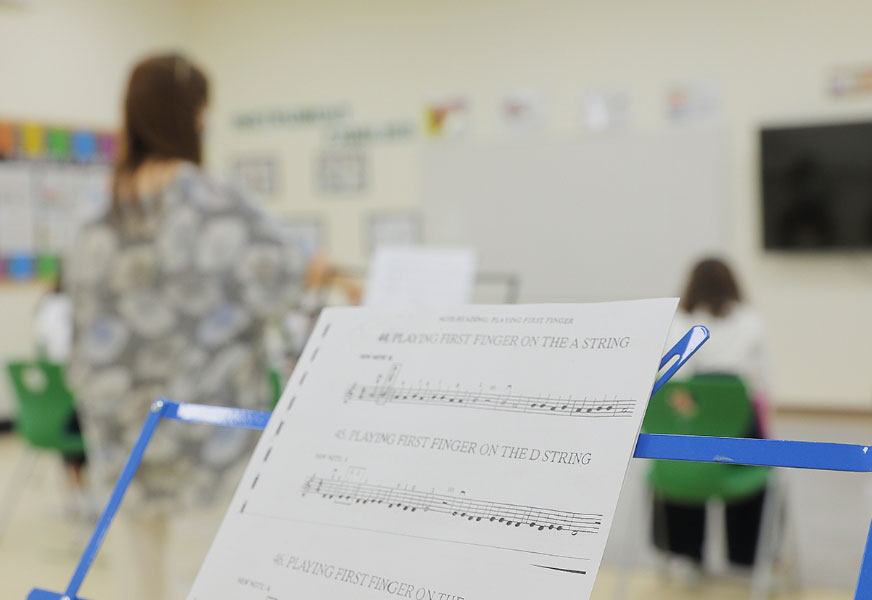
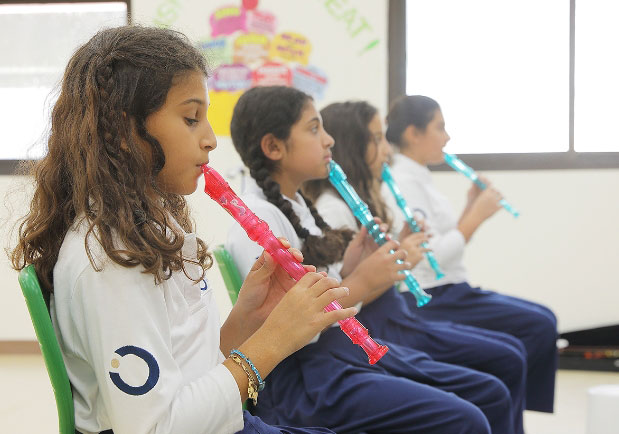
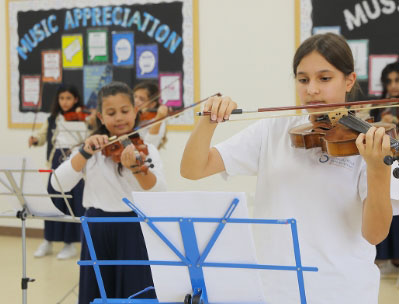
Physical Education
The Physical Education Department’s mission is to provide opportunities for our children to engage in competitive situations through sport and promote the idea that sport and physical activity are essential aspects of our day-to-day lives.
All pupils at Nün Academy join in physical activity for a minimum of two sessions each week, in our gym/sports facility or outside. Subject-area specialists plan lessons that enable our students to experience a wide range of sporting activities and become physically confident, fit and healthy.
At Key Stage 2, the PE curriculum shifts from a focus on fundamental movement skills to developing pupils’ understanding of games/activities and applying skills to game situations. Students have the opportunity to partake in a variety of team sports with a focus on the concept of teamwork, tactics and playing by the rules. They are also encouraged to look at their performance and that of others and begin to recognise how they can improve. Topics covered in Key Stage 2 include invasion games, gymnastics, dance (girls), fitness, net games, athletics, striking and field games.
At Nün Academy, we aim to provide a supportive learning environment in which each pupil develops increasing self-confidence and a desire to strive for their highest level of achievement. The combination of appropriately challenging tasks, a diverse range of teaching and learning methods and a high level of resources supports high attainment, motivation and participation.
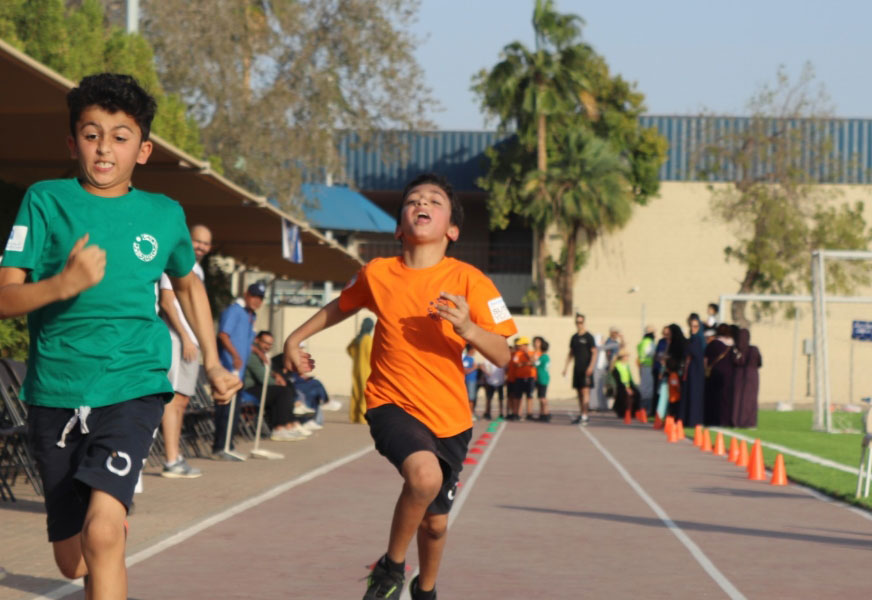
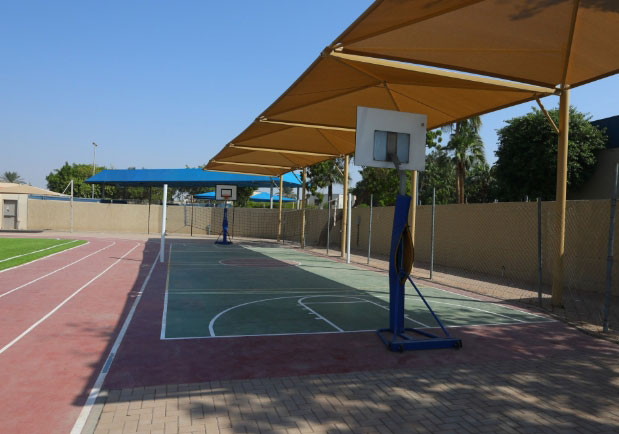
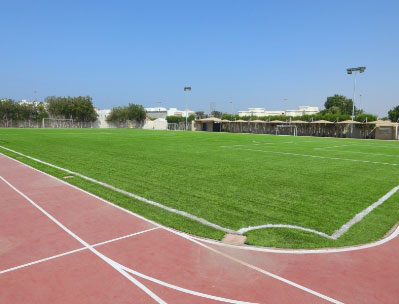
Global Studies
Our goal in teaching social studies is to help students become good citizens. We are living in a diverse society — one that requires knowledge of social studies to succeed. With a social studies background, children become adults that can participate civilly in building a modern society. Our students explore the real-world application of social studies to interact with people of all cultures and communities. History is what made the world the way it is, and people must study it to appreciate and understand the way the world works. Learning about history is what makes it possible to learn from the past and plan for the future.
In Upper Primary, students study the history and heritage of the region. They practice research skills as they delve into the history of ancient civilisation and learn how geographical characteristics affected the development of societies. They also examine the factors that cause migration and resettlement. Finally, they study the effect that technology has on culture.

